It was the deadliest and strongest earthquake in Turkey since 1939. Measuring 7.8 on the Richter scale, when it shook the ground in southeastern Turkey and northwestern Syria early Monday morning, tremors were reported from as far and wide as Lebanon, Cyprus, Greece, Israel and Palestine. News then poured in of a second quake, measuring 7.5, just nine hours later.
In its wake lies nothing but destruction. By the fifth day, the number of those who died in Turkey alone exceeded 21,000 – the total rose above 25,000, after adding fatalities from Syria. More than 78,000 people have also been reported injured so far, according to data from both countries.
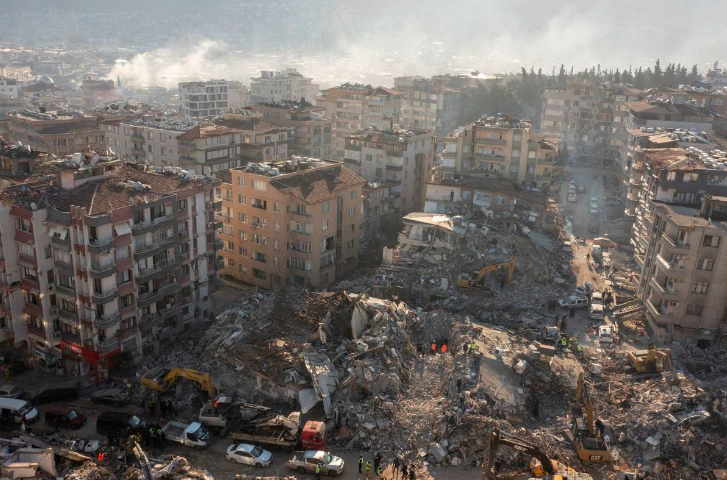
An aerial view shows damaged and collapsed buildings, in the aftermath of a deadly earthquake in Hatay, Turkey February 10, 2023. Photo: REUTERS/Umit Bektas
As Turkey reels from the aftermath of the earthquake, many people in disaster-hit regions still remain missing, presumed buried beneath the rubble with hopes of survival fading away fast. As rescue and relief efforts proceed at slow pace due to a number of challenges, the government of President Recep Tayyip Erdogan is drawing more flak than ever before over disaster ‘mismanagement’ and social media curbs.
The Turkish economy was already under immense pressure before the calamity hit. In the aftermath of the quake, it now faces the huge costs that come with rebuilding. As Turkish voices contextualise the disaster, they wonder: could this be a turning point for Erdogan’s regime?
‘The rubble is silent now’
Speaking to The Express Tribune, Rabia Çetin, an independent journalist and International Federation of Journalists (IFJ) member based in Istanbul, highlighted the uneven pace of rescue efforts following the disaster due to range of factors.
“I first observed the work in the province of Şanlıurfa, in southeast Turkey. There were around 170 casualties at that point in the area… but the [rescue] work was relatively better,” she shared. “Right after that, I came to Adıyaman, which is one of the three cities that suffered great devastation. Because the telecommunication building in the city was destroyed, the people here could not connect, and search and rescue teams arrived very late.”
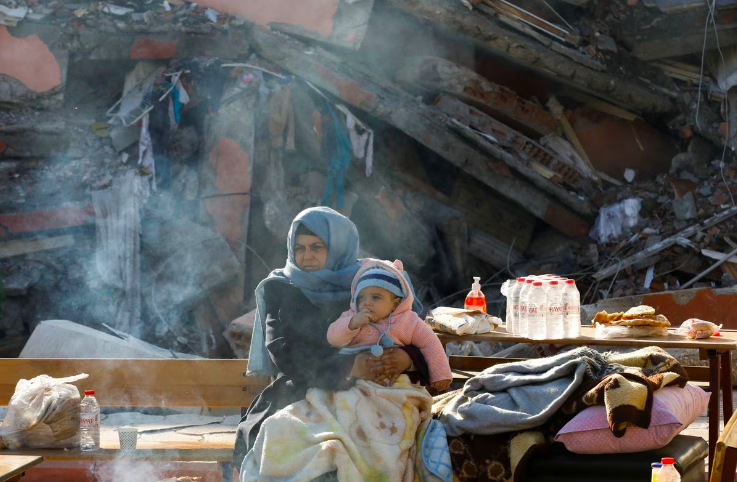
A woman holding a child sits by a collapsed building as search for survivors continues, in the aftermath of a deadly earthquake in Hatay, Turkey, February 10, 2023. Photo: REUTERS/Umit Bektas
According to Cetin, it took crew and equipment until the third day after the calamity to reach Adıyaman. “As I speak, on the fifth day after the earthquake, search and rescue efforts continue,” she said. “Unfortunately, there still is not enough equipment and the rescue efforts cannot move as fast as they should. Therefore, the loss of life is rising rapidly.”
“The rubble, from beneath which you could hear the screams and cries for help, are silent now. They show no signs of human life,” she added.
Even after bodies are pulled out, the challenges keep mounting, said Cetin. “The corpses are kept on the pavements in the city for a while. Everything is incomplete and insufficient, which increases the dimensions of the disaster,” she added.
“In short, this city has experienced destruction similar to a war zone, leaving thousands dead and fatally injured. They [the government and rescue workers] are trying to cope, but it’s not enough,” noted Cetin. According to her, even President Erdogan, during his visit to Adıyaman, was compelled to admit the country had been unable to bring the rescue operation to the desired level.
“I think international aid is very helpful. In the city where I am today, there were aid teams from Georgia, Canada, the United States and China. These teams have the necessary equipment, accelerating the digging. Therefore, any kind of help is essential at this point,” she added.
Trapped and cold
Beyond the slow pace of rescue work, biting winter and terrible weather posed additional threats to survivors, especially those still trapped, said Washington DC-based Turkish journalist Ilhan Tanir.
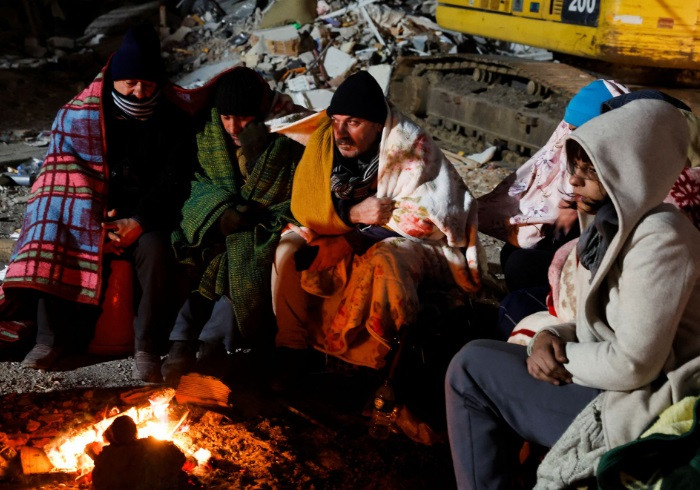
Zubeyde Kahraman (R), whose sister Zeynep, 40, is being rescued by ISAR Germany, waits by a fire with her family during the rescue operation that ISAR Germany say has taken almost 50 hours, as the search for survivors continues, in the aftermath of a deadly earthquake in Kirikhan, Turkey February 10, 2023. REUTERS/Piroschka van de Wouw
“Food, clothing, and shelter – that is what the people need in this terrible weather,” he said. “People stuck under the rubble are dying because of the cold weather. Those who managed to get out from under the rubble, with the help of their relatives or friends or by their own efforts, have been out in the open for several days.”
Millions of people are still in dire need, Tanir said, acknowledging that it is not easy to send rescue teams to every mound of rubble in the disaster area. “[But] you look at social media, and there are so many requests from [affected] people for food, clothing, and a place to stay… [They] are asking, why the Red Cross and the Turkish agency dealing with emergencies and disaster are still unable to reach the central locations.”
Cetin, too, stressed the need for shelter and warmth. “That is the most urgent need of people in the region. They need tents as well as heaters,” she said. “Hygiene equipment and mobile toilets are vitally needed as well, as are medical supplies,” the journalist added.
Disaster zones disconnected
Although the sheer magnitude of the earthquake in Turkey greatly hindered connectivity in the worst-hit regions, Turkish voices said the problem was exacerbated by Internet and social media restrictions the government had imposed.
“All earthquake zones have been equally affected from the beginning, from the restrictions imposed by the government throughout the country,” said Cetin, although she pointed out that Adıyaman has also experienced the negative effects of the collapse of the city's infrastructure in addition to government-induced restrictions.
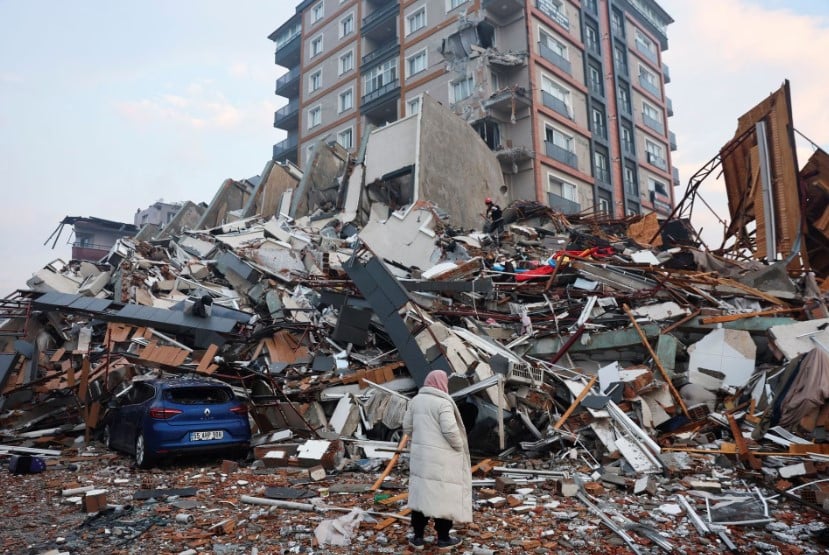
A woman looks on as rescuers search for survivors under the rubble following an earthquake in Hatay, Turkey, February 7, 2023. PHOTO: REUTERS
“No quick actions, like setting up mobile base stations immediately, were taken to restore the communication channels cut due to the demolition of the telecommunication building in Adıyaman,” she said. “Since the onset of this disaster, no eagerness has been shown to solve the problem.”
“It would be inappropriate to blame just the unwillingness and incompetency of the operators, there is more to it,” Cetin added.
Tanir, meanwhile, termed the restrictions shameful. “This week, they restricted Twitter and did not deny it. After such a disaster, you may think that there could be some technical issue, that there could be some kind of outage. But social media was restricted because people were complaining about the poor response or the lack of response,” he said.
“People were asking for rescue teams so that they can save their loved ones, their friends, their families, and what did the government do in response? It restricted social media. While thousands across the country are crying for help, trying to save their loved ones, the Erdogan regime is busy protecting its own image,” he lamented.
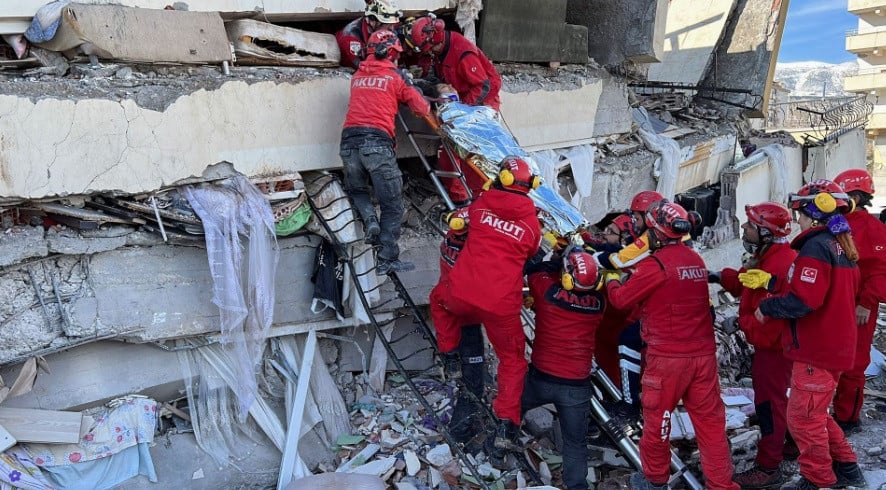
Rescuers carry a woman after she was evacuated from under a collapsed building following an earthquake in Kahramanmaras, Turkey, February 7, 2023. REUTERS/Suhaib Salem
Responding to a question about Elon Musk’s offer to set up his Starlink web service in the disaster zones, Tanir said it was obvious why the government has not taken up that offer. “They don't want the citizens to voice their concerns.”
Erdogan under fire
Speaking about political ramifications from the disaster and how it was being managed, Cetin noted that the government in Turkey has been losing support in public opinion polls due to its inability to solve problems for a long time.
But while the Erdogan regime’s failings pertaining to economic policies, weak democracy and legal record, and human rights violations were drawing ire, according to her, never before had the lack of coordination and the delay in the response seen during the earthquake so clearly been revealed.
“In Adıyaman, where the government received almost two-thirds of the votes in the last elections, earthquake survivors said: ‘I always voted for [Erdogan’s] AKP in the previous elections, but they cannot ask for votes from us anymore.’ This is a common sentiment out here. The ruling party faces a huge electoral challenge,” she said.
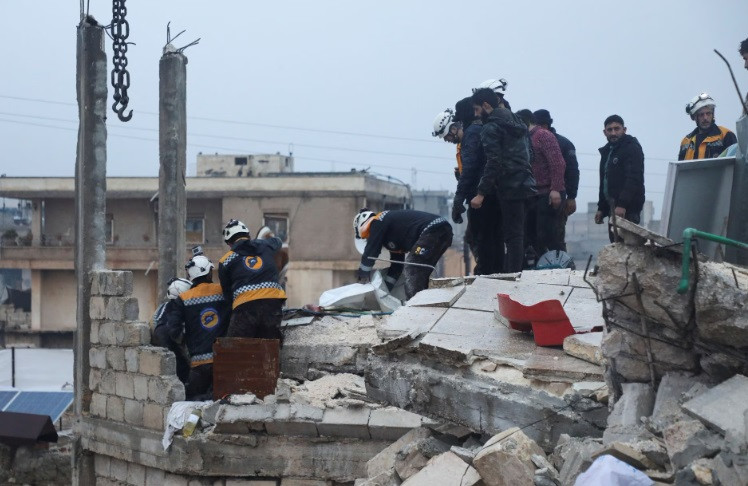
“So far, the government has been doing very poorly,” shared Tanir. “I was following the situation in the initial hours very closely and it took maybe about eight to 10 hours for people to understand the seriousness of the situation. People were waiting for Turkey’s Disaster and Emergency Management Authority (AFAD), which was not prepared even though as we all know, Turkey lies on the fault line.”
“You can’t change the location of the country, but you can definitely prepare for the disaster and perhaps even prepare to minimise the losses,” he added.
According to Tanir, after the catastrophic earthquake in northwestern Turkey that killed more than 18,000 people in 1999, the government imposed an earthquake tax that was meant to corral billions of dollars' worth of disaster prevention and relief. “People have been paying for this for the last 23 years just so that when a disaster like this hits the country, everybody is prepared, and the disaster emergency agency is ready to deploy all of its resources,” he said.
“Yes, the scale of the disaster is beyond anything imaginable. But you need to have a system and mechanism in place to deal with this,” the Washington-based journalist added. “Everybody is still complaining that the rescue teams arrived too late. Foreign rescue teams are able to arrive in cities much faster than Turkey’s own rescue workers, and I'm not talking about far-flung villages; I’m talking about cities.”
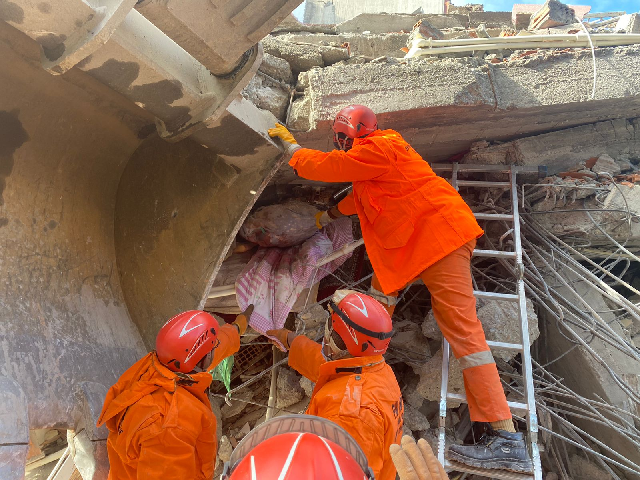
Pakistan has flown three C130 military transport planes to Adana province. PHOTO: TWITTER/@ndmapk
With no sign of rescue workers in several cities almost a week following the earthquake, Tanir said it was no surprise to see the anger on people’s faces.
“The government, for some time, has been using all its resources to suppress free speech. Even though the president has fully armed propaganda machinery, it is very difficult for him to control the narrative due to the economic situation and due to social media,” the journalist shared. “But as people try to save lives, the government tries to save its own image – the president, in a statement, said his administration was recording the names of his critics.”
“Press freedom is already at its lowest. They have arrested journalists and reporters while they're trying to cover the disaster area. This government will be judged very harshly in the not-too-distant future when the country is free from their grip,” he added, citing a quote by former Turkish president Süleyman Sami Demirel. “Administrations go the way they come, Demirel once said. So, this administration has a lot to deal with after the earthquake.”
The quake, beyond the immediate destruction, is an economic disaster and will cause instability, he noted. “We are seeing all the symptoms in Turkey that we saw in 1999. The response to the 1999 quake eliminated those who were ruling back then. Political parties were sent to the graveyard in the 2002 polls.”
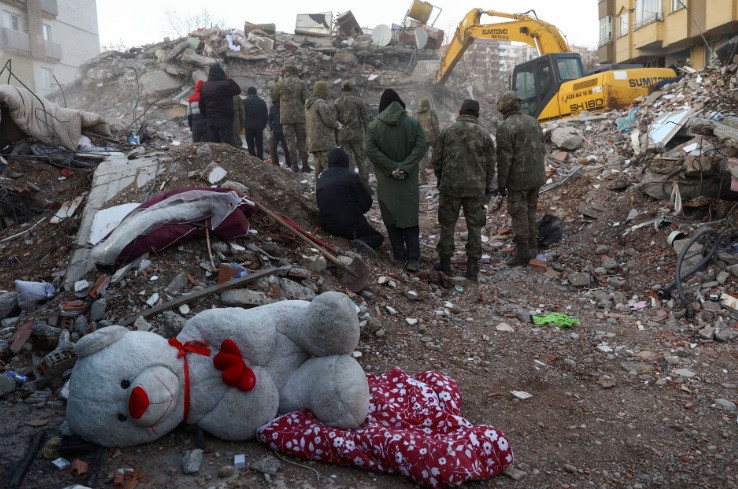
People work at the site of a collapsed building, in the aftermath of the deadly earthquake, in Kahramanmaras, Turkey, February 8, 2023. REUTERS/Ronen Zvulun
According to Dr Tuba Eldem, an associate professor of political science, Fenerbahce University, Turkey’s upcoming elections, which will take place on the republic’s centennial, will be the most critical election in the history of Turkish democracy.
“The Turkish people will elect a leader that will mould the republic’s second century and at the same time, decide whether Turkey should remain committed to a transatlantic alliance of democracies,” she said. “Political regime theories suggest that the incumbents’ chances of leaving office declines considerably if a leader rules for longer than three terms and a change in power then becomes more likely through external shocks.”
According to Dr Eldem, Turkey’s consistent economic decline since 2016, exacerbated by the pandemic and unorthodox monetary policy, placed a heavy burden on the Turkish economy. “The devastating earthquake is likely to put further strain on already limited government resources and limit the redistributive capacity of the populist government led by President Erdogan.”
That said, Tanir said there was a need to exercise caution before making any political predictions. “It is still the early days of the disaster. We will see more clearly in the coming weeks,”
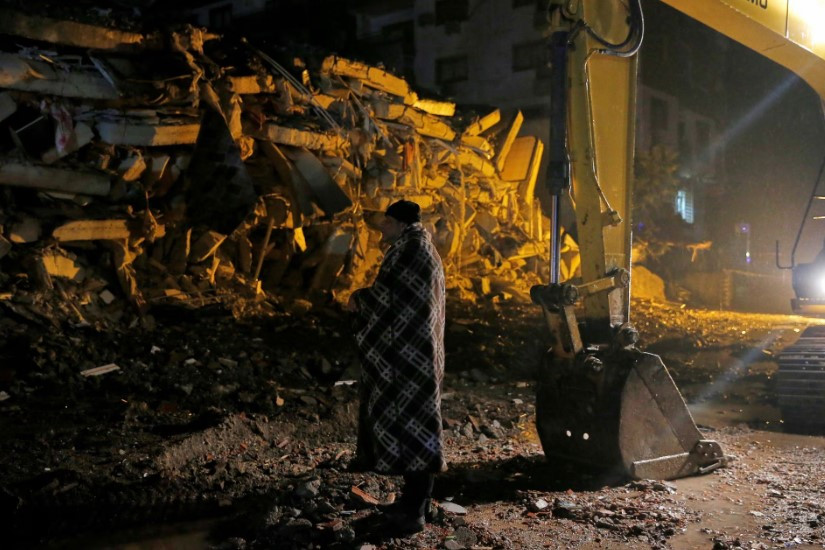
A man stands in front of a collapsed building after an earthquake in Osmaniye, Turkey February 6, 2023. PHOTO: REUTERS
“This administration already faces a raft of issues from the economy to internal discord and polarisation before this disaster. Let’s see how this administration performs in the upcoming election. Public opinion, as reported by the media, is against them,” he cautioned. “It’s difficult to say what will happen next week or next month. Hard to even say if Turkey will be able to hold elections – Erdogan may even declare a state of emergency, which can lead to postponing the polls.”
Economic bomb
Speaking to The Express Tribune about the economic impact the quake has on Turkey’s already ailing economy, Selva Baziki, a Bloomberg economist who focuses on Turkey and Sweden, said in the immediate term, the disaster could cost Erdogan’s government somewhere up to two and a half per cent of GDP.
“But if we were to include the rebuilding part, which obviously extends over a longer period of time, that could go all the way up to five and a half per cent of GDP in terms of cost of the public budget,” she pointed out.
According to Baziki, who has also previously served as a director of macro financial analysis at the Central Bank of Turkey, the country’s public finances start from a relatively good position to begin with. “Just last year, I think the latest reading was negative 1.4 per cent of GDP in terms of the deficit. The target for this year was about negative 3.5 per cent of GDP as a budget deficit. So, I think the government is actually in a good position to weather this catastrophe, in terms of what strain it would have on the public purse.”
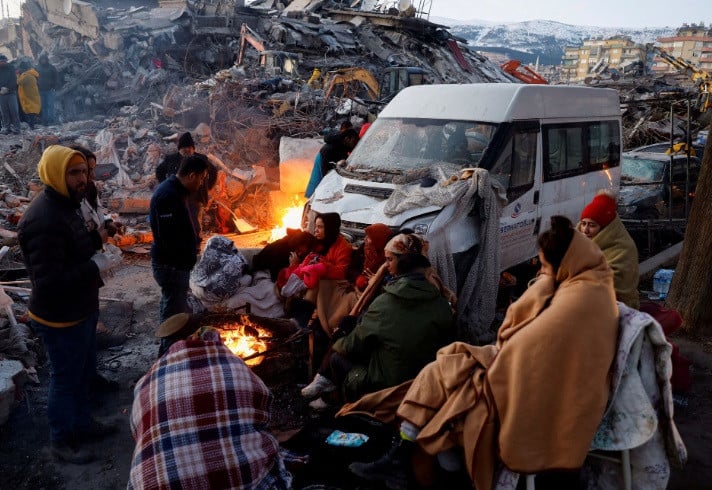
People sit around a fire next to rubble and damages near the site of a collapsed building in the aftermath of an earthquake, in Kahramanmaras, Turkey, February 8, 2023. REUTERS/Suhaib Salem
“Now, as for the longer term, of course, we'll have to see. The humanitarian cost is really going to be at the top of the agenda going forward,” she cautioned.
Baziki said there's going to be a lot of spending that the government has planned to do in the lead up to the election that's going feed into further inflation. “I'm not even considering the spending that we will have to do for the earthquake, that is a must. I'm not going to go into the inflationary effects of that, but just the plans, and also the on-going situation will take us, in our calculations, above 30% inflation at the end of the year, more than six times the central bank’s target.”
Attempts by the Erdogan to stabilise or strengthen the lira have not worked, according to Baziki. “The plan to bring about some form of stability has been in place since December 2021 and the president reportedly claimed that they would yield results within six months. The policy rate was lowered from 14 to 9 last year, even though inflation soared above 80%. But that did not translate into higher investment capital formation in the third quarter last year,” she shared.
“We were supposed to have an export boom. Exports grew by 13% in 2022, but that was dwarfed by 34% growth in imports. The economy printed an annualised Current Account Deficit of $45 billion in November. The abundance of foreign currency was supposed to have strengthened the lira. In reality, the currency has been down about 29% year to date against the dollar, the second worst performer among key emerging markets after crisis-ridden Argentina. The government was hoping to record lower inflation well. Instead, Turkey reached a 24-year peak in October with 85.5% of inflation.”
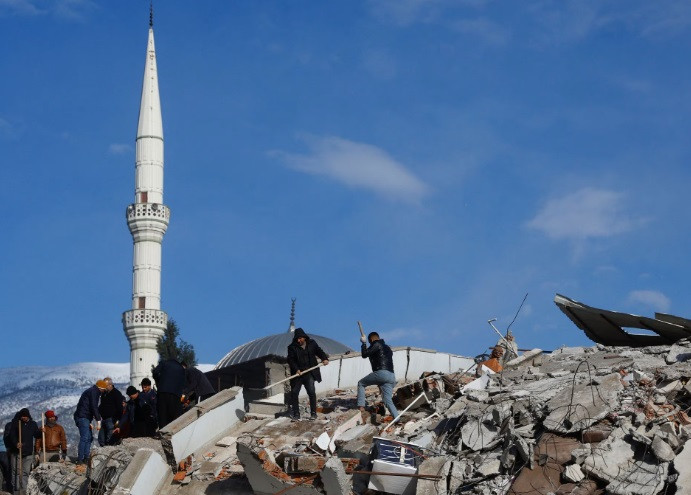
“So, clearly, the government’s economic approach was not delivering the desired results before the earthquake and they are generating a lot of discontent among voters,” the economist added. This is now compounded by the flak the Erdogan regime is drawing for its handling of the disaster from Turkish citizens.
Baziki said the Turkish economy is in need of a high level of external financing. “The economy has nearly $190 billion external debt due within a year, and we calculate the central bank’s net reserves at -53.8bn USD for December. Sure, we can keep this going for a while, but in the end, you have this debt due, that is during the year, and it needs external funds to finance that, so more borrowing.”
Turkey and Erdogan’s future
With Turkey looking at rebuilding and rescue costs ranging from anywhere between $50 billion and $70 billion, Turkish experts wondered how the country’s upcoming elections would fare, if they were even held.
“I don't know how they're going to carry out the election now, but they have to do it,” stressed Tanir. He said the challenge for the present government was massive. “Are they going to campaign for the election during these circumstances? I don't think they can, while millions of people are under such difficult circumstances.”
However, the Washington-based journalist pointed out that Turkey is home to 85 million people, only 10 to 12 million of whom reside in the disaster-hit zone. “So, Erdogan is damned if he does [campaign] and damned if he doesn’t.”
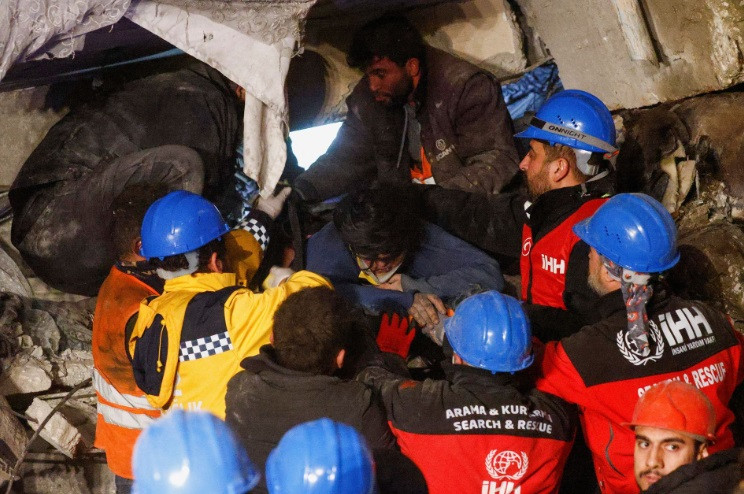
Fenerbahce University’s Dr Eldem suggested that Erdogan’s regime had lost the image of an effective and strong government. “The president now faces enhanced scrutiny from people for potentially allowing the country to become more vulnerable to earthquakes due to weakly or selectively enforced regulative standards governing the construction sector,” she said.
According to Tanir, there is sizeable corruption in the Turkish construction sector over the past 20 years. “This administration came to power after the major earthquake in 1999. It was one of the reasons why the previous administration was eliminated at the ballot box in 2002,” he recalled.
Tanir added that since then, Erdogan’s government has been issuing amnesty laws and the construction sector has been mostly unregulated. “For over two decades, they have also been collecting the earthquake tax, which may have yielded over billions of dollars by now. But despite predictions by renowned experts, the government was not prepared.”
Dr Eldem underlined that the construction sector has been a backbone of AKP’s ‘clientelist regime’ and a ‘poster child’ of its success. “President Erdogan has always praised his ruling party for changing the face of Turkey by “turning all our cities into construction sites in a short period of time. With this earthquake Erdogan’s narrative emphasising the party’s construction projects, such as building roads, bridges, or city hospitals, also collapsed,” she said.
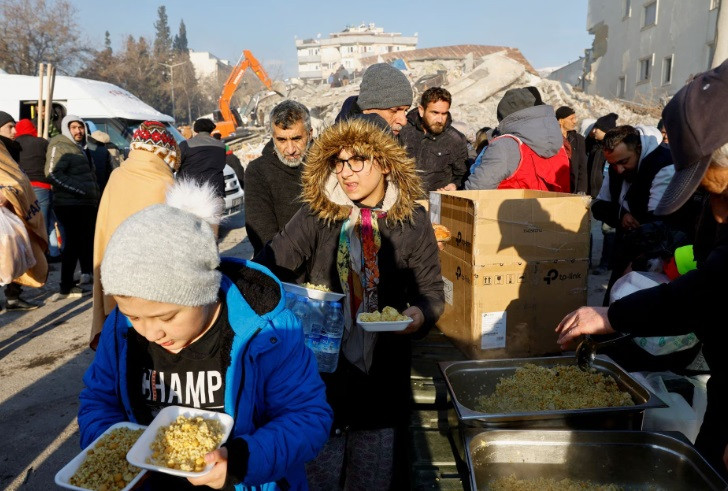
Now, she pointed out, the Turkish government will face significantly high costs for recovery and reconstruction of the roads, bridges, buildings, and other infrastructure. Disruption of business operations in the region will inevitably cause a decrease in economic activity and increase in poverty, she predicted.
“Around 15 per cent of the population lives in that region which produces close to 10 per cent of GDP. Already before the earthquake, Erdogan’s popular support was falling at its historical low and his populist discourse based on anti-establishment appeals have not appealed to youth,” Dr Eldem said.
According to the academic, the devastating earthquake, particularly the total collapse of those apartments that were constructed according to regulations adopted after the 1999 earthquake, has exposed the inefficiency of the government to enforce already existing rules for building safety. The Turkish government’s emergency response to the earthquake has also revealed the unpreparedness for emergency relief and management, she noted.
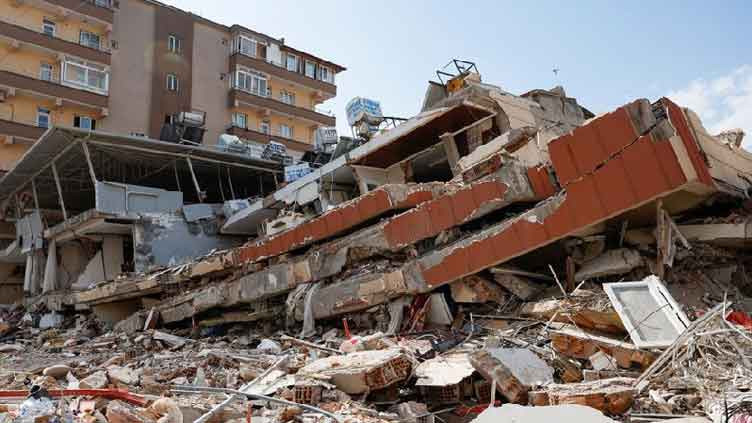
Turkish woman dies day after her rescue following 104 hours under quake rubble. PHOTO: AFP
“Although the impact of the earthquake on regime survival will depend on the extent to which it will provide adequate support to affected communities, the immediate government response, or failure to respond, have created widespread social discontent,” Dr Eldem said, drawing comparisons of the situation after the present disaster with the post-1999 earthquake scenario.
Going forward, she suggested Turkey would need to undertake significant reforms in its political and economic governance system while trying to effectively respond to the needs of the affected population and improve its disaster preparedness and response capabilities. “On the positive side, such a natural disaster has shown the importance of national and international solidarity,” Dr Eldem said. “In its second century, Turkey has a long to-do list waiting ahead of it.”
